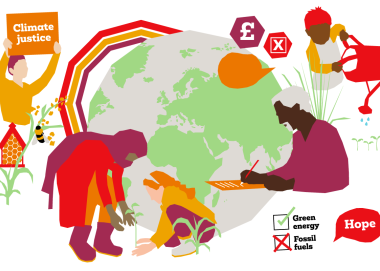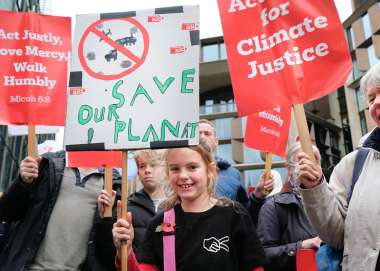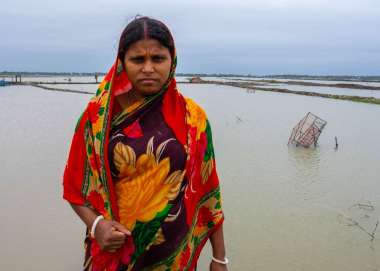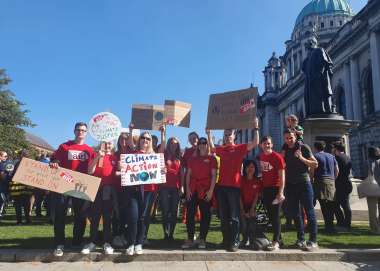We hold a vision of a better world, free from poverty and climate change. Where everyone has enough to eat, and can live without fear of their home and land being destroyed.
But right now, millions of the world’s poorest people are feeling the worst impacts of climate change, and experts predict more floods, drought and extreme weather patterns to come. For those living in poverty, this means more hunger, conflict and insecurity, and a more uncertain future.
2018
People from all over Ireland, and some of our partners overseas, share green hearts to symbolise their support for action to tackle climate change.
On Valentine's Day we join with other organisations to #showthelove and to call for urgent action by governments and all those in leadership.
Image credits and information

Image credits and information

2016
A historic deal at the UN climate talks in Paris has the potential to be a new dawn for climate campaigning.
In November, climate rally events take place around the world. Hundreds gather outside St Anne's Cathedral, Belfast to call for a fair deal at the Paris UN climate talks.

Image credits and information

Christian Aid Ireland joins with Stop Climate Chaos on Sandymount Strand, Dublin, to call on the Irish government to stop burying their heads in the sand on climate change.
We see great strides in climate campaigning as the UK announces a phase out of coal in October 2015.
Image credits and information

Image credits and information

2015
Thousands of Christian Aid supporters take part in Speak Up – the biggest ever lobby of parliament on climate justice. More than 330 MPs hear our demands that the newly elected government take action on climate change. Supporters from Northern Ireland take part via a Skype connection with Westminster and through local lobby events in their constituencies.
During the Hunger for Justice weekend, churches lobby MPs to put climate at the heart of party manifestos ahead of the 2015 UK General Election. In York, Archbishop Sentamu welcomes Filipino climate activist Voltaire Alferez to address the York Synod about climate change.
Image credits and information

Image credits and information

2014
The People’s Climate Marches take place around the globe as the UN meets for a special climate change summit in New York. These are the biggest climate marches the world had seen to date.
2012
After years of campaigning, we finally help get the World Bank out of funding coal power stations in middle-income countries.
Image credits and information

Image credits and information

Margaret Kisilu from BIDII in Kenya, an organisation we support, takes part in Bearing Witness in Northern Ireland, at which we lobby the Northern Ireland Assembly for a Northern Ireland Climate Change Act.
Christian Aid continues to support the church to be at the heart of the climate movement in the UK. At our Bearing Witness event in Manchester, thousands of churchgoers call on the new government to keep its promise to be the greenest ever.
Image credits and information

Image credits and information

2011
At the climate talks in Durban, we campaign for, but ultimately fail to save, the Kyoto Protocol, a key piece of legislation drafted to ensure that national climate targets are legally binding.
2010
We called on companies to come clean about their own carbon emissions and for the UK government to make sure this transparency is enforced by law. Finally, in 2012, they announce that carbon reporting will become mandatory by law.
Image credits and information

Image credits and information

Campaigners from Northern Ireland travel overland to Copenhagen to join mass demonstrations during the UN climate change talks.
2009
Ahead of the Copenhagen climate talks, hundreds of campaigners demonstrate support for action on climate change at The Wave climate rally in Belfast and Dublin.
Image credits and information

Image credits and information

Hundreds of campaigners take part in our Cut the Carbon march, which set sail from Bangor, Northern Ireland, and ended in London, including Church of Ireland minister Neil Cutliffe. The following year, the UK government passed the Climate Change Act – the world’s first act to contain legally-binding targets to reduce carbon emissions.
2007
Evidence shows that climate change is making traditional methods to tackle poverty inadequate. In Burkina Faso, approximately 250,000 families rely on water from the Louda Dam, but there has been very little in it over the past few years as a result of changing weather patterns. It is predicted that by 2020, climate change could leave up to 250 million more sub-Saharan Africans in poverty.
Image credits and information

A cleaner future is possible
Fossil fuels (coal, oil and gas) need to be left in the ground if we are to protect God’s earth. But governments and institutions (including the banks that hold our current accounts) still have money tied up in their extraction.
Now more than ever, we need to make the big shift from dirty fossil fuels into clean energy for a better future for everyone.






